I’m here to tell you why a Morton water softener is a game-changer for anyone battling hard water. After years of dealing with crusty faucets and scratchy towels, I took the plunge and haven’t looked back.
This article breaks down my real-world experience, the good stuff, the not-so-great parts, and how to keep your system humming.
By the end, you’ll see why Morton is worth your money. Trust me, soft water makes life better—grab a Morton and feel the difference!
My Journey With The Morton Water Softener
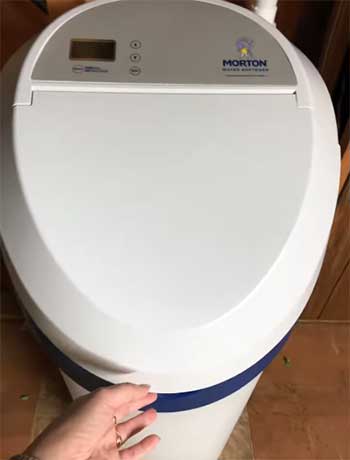
Picture this: my morning shower used to feel like I was rinsing off with sandpaper.
Hard water in my area left my skin dry, my hair dull, and my appliances looking like they’d been through a mineral war.
Dishes had white spots, and my coffee maker groaned with scale buildup.
I’d had enough. After researching, I landed on the Morton M34 Elite Water Softener, lured by its solid reputation and budget-friendly price.
I ordered it from Menards, and a plumber installed it in my basement in under two hours.
The first week was a revelation. My skin felt smoother, like I’d upgraded my soap to some fancy spa brand. Shampoo lathered up like a dream, and my towels?
Fluffy, like they’d just come out of a five-star hotel dryer. The dishwasher stopped leaving cloudy residue on glasses, and my water heater seemed to sigh in relief. The Morton M34’s LCD display was easy to navigate, letting me tweak settings without a manual.
I noticed the salt tank needed a top-up after about six weeks, but the low-salt indicator light gave me a heads-up, so no stress there.
What stood out was the “Look Ahead” technology. It learned my household’s water habits—two adults, one kid, and a dog—and regenerated only when needed, saving salt and water. I even tested the water hardness with strips (you can get free ones from Morton’s site), and the results went from 15 grains per gallon (gpg) to a silky 2 gpg.
The only hiccup?
The unit arrived with a small dent, likely from shipping, but it didn’t affect performance. Five months in, I’m hooked. This thing’s a quiet hero in my basement, and I’m kicking myself for not getting one sooner.
The Pros of Morton Water Softeners
Morton water softeners have a lot going for them, and I’m not just saying that because my showers are now spa-level. Here’s what makes them stand out, based on my experience and digging into user feedback.
- Budget-Friendly Without Skimping on Quality
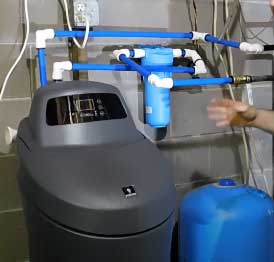
Morton’s lineup, like the M34 or M30, won’t break the bank.
I paid around $600 for my M34, which is a steal compared to high-end brands like Kinetico that can hit $2,000.
Despite the lower price, Morton delivers solid performance.
The M34 handles my family’s water needs (about 300 gallons daily) with ease, and its 34,000-grain capacity is perfect for medium-sized homes.
You’re getting reliable ion-exchange tech without paying for bells and whistles you might not need.
- Smart Tech That Saves Resources
The “Look Ahead” and Demand Initiated Regeneration features are genius. My M34 tracks when we use water—like morning showers or laundry Sundays—and regenerates during off-hours, usually around 2 a.m.
This means no hard water surprises during a shower, and it uses less salt and water than older systems. Morton claims it cuts salt use by up to 50% compared to traditional models, and my two-bag-per-two-month usage seems to back that up. It’s eco-friendly and keeps my utility bills in check.
- Compact Design for Tight Spaces
My basement’s cramped, but the M34’s single-tank design (about 15 x 48 inches) fits like a glove. Unlike dual-tank systems that need more room, Morton’s all-in-one setup is a lifesaver for small homes or apartments.
The salt tank and resin bed share the same cabinet, so you’re not juggling multiple units. Installation was a breeze, too—my plumber didn’t have to rearrange pipes or knock out walls. If space is an issue, Morton’s got you covered.
- Iron Removal for Well Water Users
If you’re on well water, Morton’s a solid pick. My M34 can handle up to 7 parts per million (ppm) of iron, which is common in rural areas. I don’t have a well, but friends in the countryside swear by Morton’s ability to tackle rusty stains without a separate iron filter.
The M45C even bumps that up to 12 ppm, so you’re covered for tougher water conditions. This feature saves you from buying extra equipment, which is a win in my book.
- Easy-to-Use Controls
I’m no tech wizard, but the M34’s LCD panel is straightforward. Four buttons—up, down, select, and recharge—let you set the time, water hardness, and manual regeneration if needed. The low-salt light blinks when it’s time to refill, so you’re not guessing. Compared to clunky analog timers on older softeners, this feels modern without being overwhelming. Even my tech-averse dad could figure it out.
The Not-So-Good Parts of Morton Water Softeners
No product’s perfect, and Morton’s got a few quirks that might give you pause. Here’s the real talk on what could be better, based on my use and what others have said.
- Limited Warranty Coverage
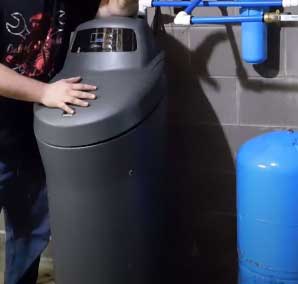
Morton’s warranty is a mixed bag.
The tank gets a generous 10 years, which is great, but the parts—like the control valve or electronics—only get one year.
Some brands, like Aquasana, offer lifetime warranties on tanks and longer parts coverage.
I haven’t needed repairs yet, but the short parts warranty makes me nervous about future costs.
If you’re buying, consider using Morton’s MWSC cleanser regularly to extend the parts warranty to five years.
- No Lifetime Warranty Option
Unlike SpringWell or Pelican, Morton doesn’t offer a lifetime warranty, even on premium models. This bugs me because a water softener is a long-term investment. My M34 should last 10-15 years with care, but knowing I’d have to pay for major repairs down the line feels like a gamble.
If peace of mind is your priority, you might lean toward brands with more robust guarantees.
- Power Outage Resets
Here’s a pain point: if the power goes out for more than eight hours, you might need to reset the clock on some Morton models. My M34 has power interruption protection, but I’ve read complaints about older units, like the M30, losing settings completely.
Reprogramming isn’t rocket science, but it’s annoying, especially if you’re not home when power’s restored. Higher-end models like the M45C have backup batteries, but that’s not standard across the board.
- Not Ideal for Very Hard Water
Morton’s great for mild to moderate hardness (up to 15 gpg in my case), but if your water’s off-the-charts hard (say, 20+ gpg), you might need a beefier system. The M45C, Morton’s top model, is rated for “high hardness,” but reviews suggest it struggles with extreme conditions.
I saw a friend’s M34 underperform in a rural area with 25 gpg water, needing frequent regeneration. For super-hard water, SpringWell’s dual-tank systems might be a better fit.
- Shipping and Packaging Issues
My M34 arrived with a dent, and I’m not alone. Online reviews mention damaged units or broken parts, like cracked rims, due to poor packaging. Morton’s customer service was responsive when I called, sending a replacement part in 10 days, but it’s a hassle. If you’re ordering online, check the box carefully before signing off, or opt for in-store pickup to avoid shipping woes.
Maintenance Tips To Keep Your Morton Running Smoothly
Keeping your Morton water softener in top shape isn’t rocket science, but it takes a bit of TLC. Here’s how I keep my M34 humming, plus tips to save you time and money.
- Check Salt Levels Monthly
Your softener’s only as good as its salt supply. I check my M34’s brine tank every four weeks, making sure it’s at least half-full. Morton recommends their Clean and Protect or Rust Defense pellets, and I use about two 40-pound bags every two months.
The low-salt light helps, but don’t wait for it to blink—top up early to avoid hard water sneaking through. Pro tip: keep a bag handy in your garage for quick refills.
- Use the Right Salt
Not all salts are equal. I stick with Morton’s Clean and Protect pellets because they’re 99.6% pure and resist “bridging” (when salt crusts over and blocks the tank). Their Rust Defense pellets are great if you’ve got iron issues. Potassium chloride works too, if you’re watching sodium intake, but it’s pricier.
Avoid rock salt—it’s dirtier and can clog your system. Using Morton’s salt also ties into their warranty extension, so it’s a smart move.
- Clean the Resin Bed Every Four Months
Mineral buildup can gum up your resin bed, so I use Morton’s MWSC Water Softener Cleanser every four months. It’s a budget-friendly phosphoric acid cleaner that flushes out iron, calcium, and manganese. Just pour a bottle into the brine tank, run a manual regeneration, and you’re done.
This keeps my M34’s performance crisp and extends its life. If you’ve got heavy iron, consider a stronger cleaner like Pro Products Res Care.
- Test Your Water Hardness Regularly
I test my water every three months with Morton’s free test strips (you can request them online). It’s a quick way to confirm your softener’s doing its job. My pre-installation 15 gpg dropped to 2 gpg, and it’s stayed there.
If you notice hard water signs—like spotty dishes or dry skin—test immediately. You might need to adjust settings or check for a malfunction. Regular testing catches issues early.
- Schedule Annual Professional Checkups
I’m no plumber, so I book a pro to inspect my M34 once a year. They check the valve, resin bed, and brine tank for wear or leaks. It costs about $100, but it’s cheaper than replacing parts. My plumber caught a loose fitting early, saving me from a bigger headache.
If you’re DIY-savvy, Morton’s manuals are clear, but don’t skip this step—small issues can snowball.
How Morton Stacks Up Against The Competition?
Picking the right water softener is like choosing your go-to pizza joint—everyone’s got something tasty, but only one hits all your cravings. My Morton M34 Elite has been a game-changer for my home’s hard water, but how does it stack up against Alamo, Novo, and Hague?
I’ve put these brands head-to-head, comparing specific models on key factors to help you decide. Here’s my real-world take, based on using the M34 and digging into what other users say about these competitors.
Morton M34 Elite Vs. Alamo Elite 32K
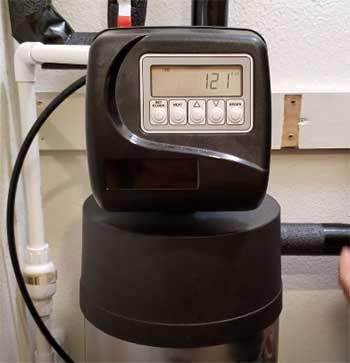
- Price and Affordability: My Morton M34 set me back about $600, including installation, making it a steal for a 34,000-grain softener that handles my 3-person household’s 15 grains per gallon (gpg) water. Alamo’s Elite 32K, priced around $800, is a bit pricier, and with installation, you’re looking at $1,000-$1,200. Morton’s lower cost gives you solid softening without breaking the bank, while Alamo’s higher price includes a sediment pre-filter, which Morton lacks.
- Performance and Capacity: The M34 softens my 15 gpg water to a silky 2 gpg, leaving dishes spot-free and skin smooth. Its 34,000-grain capacity suits medium homes, regenerating every 5-7 days. Alamo’s 32,000-grain Elite 32K performs similarly for moderate hardness but shines for well water with its built-in sediment filter, handling up to 8 parts per million (ppm) of iron. Morton’s iron removal (7 ppm) is close but needs occasional resin cleaning for heavy iron.
- Features and Technology: Morton’s “Look Ahead” tech learns my water usage—think morning showers and laundry Sundays—and regenerates only when needed, saving salt and water. The LCD controls are a breeze to use. Alamo’s Elite 32K uses a basic digital meter, which is reliable but less intuitive. It lacks Morton’s predictive smarts, so you might use more salt over time.
- Maintenance and Durability: I top off my M34’s salt every six weeks and use Morton’s MWSC cleanser quarterly to keep the resin bed fresh. The 10-year tank warranty is solid, but parts get just one year. Alamo’s Elite offers a 7-year tank warranty and 3 years on parts, with similar maintenance needs. Morton’s simpler design makes DIY upkeep easier, but Alamo’s filter adds a step for well users.
Morton M34 Elite Vs. Novo ClearWater 36K
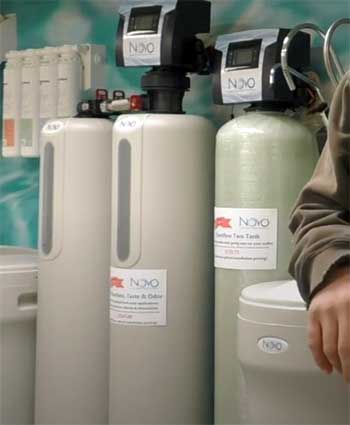
- Price and Affordability: At $600, the M34 is a budget-friendly champ. Novo’s ClearWater 36K, around $700, is close but feels basic for the price. Installation costs are similar (about $200), but Morton’s efficiency tech makes it cheaper to run long-term, as Novo’s analog system guzzles more salt.
- Performance and Capacity: The M34’s 34,000-grain capacity handles my 300 gallons daily with ease, dropping hardness from 15 gpg to 2 gpg. Novo’s 36,000-grain model matches this for medium homes but struggles with very hard water (20+ gpg), where my friend noticed spotty dishes. Morton’s consistent softening gives it an edge for most households.
- Features and Technology: Morton’s LCD and “Look Ahead” system make it feel modern—regeneration happens at 2 a.m., so I never notice it. Novo’s ClearWater uses an old-school analog timer, which is reliable but clunky to adjust. If you like set-it-and-forget-it tech, Morton’s smarter setup wins hands-down.
- Maintenance and Durability: My M34 needs salt checks monthly and resin cleaning every four months, which is straightforward. Novo’s maintenance is similar, but its analog valve can stick if not cleaned regularly. Morton’s 10-year tank warranty beats Novo’s 5 years, though both have short parts warranties (1-2 years). Morton’s digital controls feel more durable for daily use.
Morton M34 Elite Vs. Hague WaterMax 32K
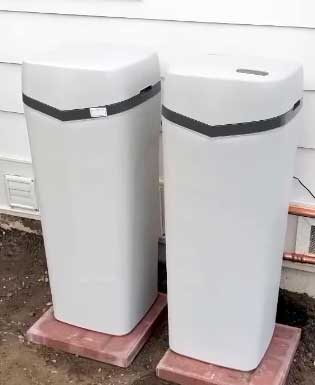
- Price and Affordability: The M34’s $600 price tag is a bargain compared to Hague’s WaterMax 32K, which starts at $1,500, plus $300-$500 for installation. Hague’s premium cost includes advanced features, but Morton delivers comparable softening for half the price, making it better for budget-conscious buyers like me.
- Performance and Capacity: Both the M34 and WaterMax handle 32,000-34,000 grains, perfect for my 15 gpg water. Hague’s dual-compartment design tackles iron (10 ppm) and hardness simultaneously, slightly outperforming Morton’s 7 ppm iron removal. For extreme conditions, Hague’s edge is noticeable, but for my needs, Morton’s softening is just as effective.
- Features and Technology: Morton’s “Look Ahead” and Demand Initiated Regeneration save resources by regenerating based on usage. Hague’s WaterMax goes further with customizable cycles and a multi-compartment tank for tailored water treatment. Its digital interface is sleek but complex—my M34’s simpler controls suit me better for everyday use.
- Maintenance and Durability: Hague’s maintenance is more involved due to its multi-compartment system, requiring specific resins and cleaners. My M34’s single-tank setup is easier—salt refills and occasional MWSC cleaner do the trick. Hague’s lifetime tank warranty trumps Morton’s 10 years, but its parts warranty (5 years) is only slightly better. Morton’s simplicity wins for hassle-free upkeep.
Which Should You Choose?
Morton’s M34 is my pick for affordability and ease, perfect for small to medium homes with mild to moderate hardness (up to 15 gpg). Alamo’s Elite 32K is great for well water users needing sediment filtration, but it’s pricier. Novo’s ClearWater 36K is a budget rival, but its outdated tech lags behind.
Hague’s WaterMax is the premium choice for complex water issues, but its cost and maintenance are steep. Test your water’s hardness and iron levels, then match your budget and space—Morton’s my sweet spot, but your needs might point elsewhere.
Frequently Asked Questions (FAQ)
Yes, Morton water softeners are solid for most homes. My M34 handles 15 gpg water beautifully, delivering soft, silky water for showers and appliances. They’re affordable, compact, and have smart tech like “Look Ahead” to save salt. But they’re not perfect for very hard water (20+ gpg) or tech enthusiasts wanting Wi-Fi controls. For budget-friendly performance, they’re a great choice.
It depends on your needs. Morton’s my pick for affordability and ease, but SpringWell shines for very hard water with its dual-tank design and lifetime warranty. Kinetico’s premium for high-end homes, while Aquasana’s salt-free system suits low-maintenance fans. Test your water hardness and compare warranties—SpringWell often tops lists for versatility, but Morton’s hard to beat on price.
With proper care, Morton softeners last 10-15 years. My M34’s still young, but regular maintenance—like monthly salt checks and quarterly resin cleaning—extends life. The tank’s warrantied for 10 years, but parts like valves may need replacing sooner. Annual pro checkups catch issues early. User reviews back this lifespan, assuming you don’t skimp on upkeep.
Absolutely. Morton’s Clean and Protect pellets, which I use, are 99.6% pure, preventing clogs and bridging. Their Rust Defense pellets tackle iron, and potassium chloride is a sodium-free option. They’re formulated for Morton systems, ensuring efficiency and warranty compliance. Other salts work, but Morton’s reliability and availability make it my go-to.
Conclusion: Morton’s Your Ticket To Soft Water Bliss
If hard water’s cramping your style, a Morton water softener is your answer. My M34 turned my home’s water from gritty to glorious, and I’m not alone in loving it. Affordable, smart, and compact, it’s a no-brainer for most households.
Don’t let scale and dry skin win—get a Morton and enjoy the soft water life. You’ll wonder why you waited so long!
